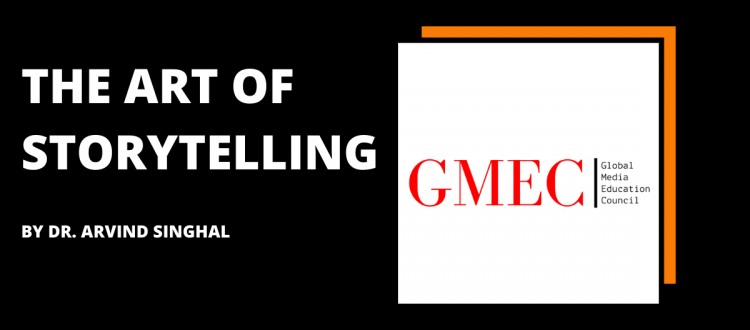The Art of Storytelling by Arvind Singhal
About a century ago, noted British author and novelist, G. K. Chesterton, who had a gift for using proverbs, metaphors, and allegories wrote: “Fairy tales are more than true: not because they tell us that dragons exist, but because they tell us that dragons can be beaten.”
Chesterton’s pithy sentence celebrates the potential that lurks in stories: the power to attract our attention, spark our imagination, and paint new scenarios of hope; the power to experience vicarious struggles and epic wins; the power to demonstrate how “monsters” — whether personal or societal — can be overcome, vanquished. It is no wonder that Aesop’s Fables, stories of the Panchtantra, or 1001 Arabian Nights have enthralled readers and listeners, young and old, male and female, for millennia.
More generally, stories can take us to places where we have never been across time and space. They can allow us to ride on the shoulder of giants, creating moments of pause, reflection, insight, and inspiration.
Here are three of my favourite stories as well as my reflections on them.
The first story is about Abraham Lincoln. Lincoln was a tall man. Six foot four inches tall. Add his stovepipe hat, and you have a seven-footer. During the Civil War, a Union soldier asked him:
“Mr President, how tall are you?”
Without batting an eyelid, Lincoln replied:
“Son, Like You, Tall Enough that my feet reach the ground.”

My reflection: Lincoln measured height not as we usually do—in feet and inches or meters and centimeters. Lincoln emphasized the common ground. To me he is saying that greatness lies not with a tall man, or even the President, or the Commander-in Chief, or with one who “towers” over others. But with everyone—the common man, the common person. This story is deeply inspirational in how Lincoln connects in a “familial” way with the soldier and with deep humility.
The second story is about Mother Teresa.
Once, in Washington D.C., Mother Teresa was asked by hundreds of activists if she would “March with them against the Vietnam War.”
Sorry, my child. I will not march against the war,” She said. “But, if you were to March for peace, I would be the first to lead”.

My reflection: Mother Teresa points to the importance of reframing—that everything changes when the frame changes. As social change practitioners, we often try to solve problems by asking “What are we up against? “What is not working?” As problem solvers, we have a love-affair with problems, deficits, needs, gaps. Then we try to plug them as experts. Unfortunately, we are not very good at it. Like Mother Teresa, if we flipped our way of thinking, and asked: What are we for, or what is working? This flipped frame would take us to a very different place.
The third story is about Mahatma Gandhi. When travelling by train, he always travelled third class. When he was asked by fellow Indians,
“Bapu, why do you travel third class?”
His response: “I travel third class because as you know there is no fourth class.”

My reflection: Mahatma Gandhi had an uncanny ability to take the perspective of the most marginalized, the most vulnerable. Here he was greatly influenced by the thinking of John Ruskin and his writings on “Unto this last.” As he often said: “I will give you a talisman. Whenever you are in doubt, or when the self becomes too much with you, apply the following test. Recall the face of the poorest and the weakest man [woman] whom you may have seen, and ask yourself, if the step you contemplate is going to be of any use to him. Will he gain anything by it? Will it restore him to a control over his own life and destiny?”
In closing, stories can educate, enlighten, motivate, and inspire. I believe that stories are “data with a soul.” I believe stories can deeply enrich classrooms, especially of topics that are perceived as technical or dull.
***
Additional Storytelling Resources:
For more on science and storytelling, you may enjoy watching this talk I gave:
https://www.youtube.com/watch?v=9TUvAN7Ju8k
For more on my work on entertainment education and transmedia storytelling watch this talk I gave: https://vimeo.com/452863923

